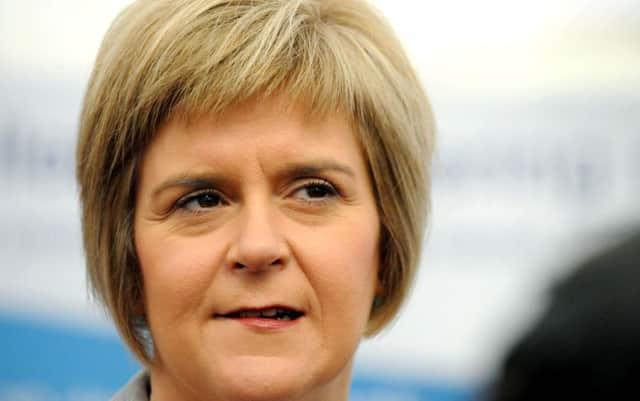Leader: Nicola Sturgeon federalist line a mistake


First Minister-elect Nicola Sturgeon has demanded that, in order for the UK to leave the European Union as a result of a future public vote, there would have to be a majority in each of the four countries of the kingdom.
Effectively, Ms Sturgeon wishes Scotland to have a veto over a decision made by the entire UK.
Advertisement
Hide AdAdvertisement
Hide AdWe can see why the next leader of the SNP senses political mileage in this issue. During the Scottish independence referendum campaign, Unionists warned that a Yes vote would mean Scotland being excluded from – and forced to re-apply for membership of – the EU.
Her Unionist opponents made the value to Scotland of EU membership a central plank of the referendum campaign. The message was clear: EU membership was crucially important to Scotland.
Ms Sturgeon can be blamed neither for making capital out of a perceived threat to that membership nor for doing so in terms which might show her willing to fight hard to preserve that which we are told is in Scotland’s interest.
But eye-catching as Ms Sturgeon’s demand may be, it doesn’t take into account the reality of the independence referendum. What’s more, it pre-empts the work of Lord Smith’s Commission on further Scottish devolution.
Ms Sturgeon makes her demand as if she were already the First Minister of Scotland within a federally arranged UK. This, plainly, is not the case.
And even if she were, Ms Sturgeon would surely be disappointed. A fully federal UK, with a reformed House of Lords giving balanced representation across the four nations, would still see foreign affairs as a reserved matter.
The SNP yesterday suggested that remarks during the referendum campaign by former prime minister Gordon Brown – that “the old United Kingdom constitution… is all going” – supported Ms Sturgeon’s position. This is quite a leap. Mr Brown’s remarks do nothing of the sort.
No more convincing was the claim of SNP MP Pete Wishart that David Cameron’s description of the UK as a “family of nations” meant Scotland should be able to veto a decision to quit the EU.
Advertisement
Hide AdAdvertisement
Hide AdThe SNP’s demand will get nowhere and, should the Conservatives win the next general election and proceed to hold a referendum on the UK’s membership of the EU, the result will be binding in every part of the country.
Since the referendum, the SNP has sought to characterise pledges made by Unionists as amounting to devo-max. But Scots did not vote for that. Instead, should Ms Sturgeon require to be reminded, the vote was 55-45 in favour of remaining part of the UK.
And that means abiding by decisions that affect the UK.
Waiting times must remain a focus
There is a reason why political parties of every hue make promises about waiting times in the NHS. They know that it’s an issue that, at some point, is likely to affect almost all of us.
One of the most pernicious aspects of suspected ill health is the anxiety caused by waiting for tests. Many of us will know someone who has been through the most unbearable stress while waiting for a medical appointment.
Targets set by politicians are not always all they are cracked up to be. Sometimes – such as in the case of smaller class sizes, for example – the promise is made because it sounds good rather than because there’s much evidence it actually does good.
But efforts to reduce NHS waiting times are important and should remain a priority.
This self-evident truth has collided with a report by Audit Scotland. Having examined the NHS, the public spending watchdog says that the continuing drive to cut waiting times may have to be reconsidered.
Audit Scotland says that soaring healthcare costs caused by an ageing population and the increasing cost of drugs could make it difficult to maintain a focus on cutting NHS waiting times.
Advertisement
Hide AdAdvertisement
Hide AdThe report’s authors point out that a number of key waiting time targets were missed last year.
Undoubtedly, there are pressures ahead for the Scottish NHS but the commitment to cut waiting times should not be the first victim in a round of “efficiencies”.
Swift treatment doesn’t only improve the chances of physical recovery, it also eases the mental anguish of those coming to terms with serious illness.
SEE ALSO
CONNECT WITH THE SCOTSMAN
• Subscribe to our daily newsletter (requires registration) and get the latest news, sport and business headlines delivered to your inbox every morning